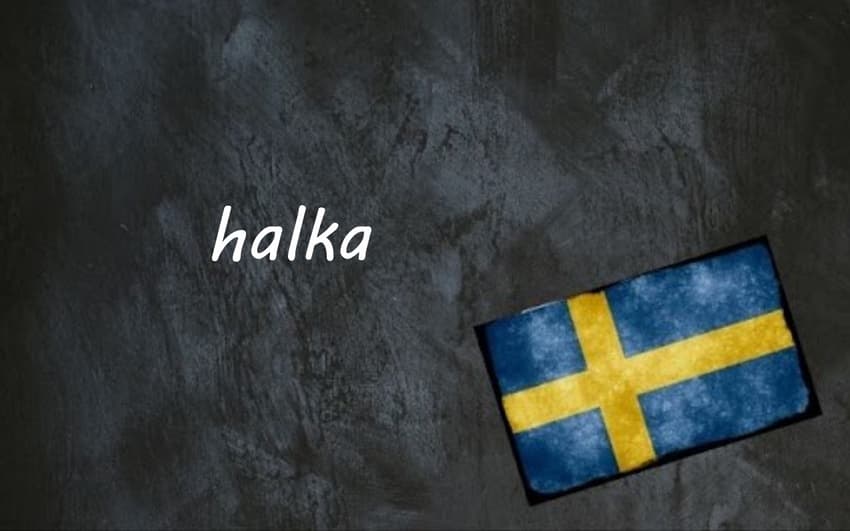Swedish word of the day: halka

Here's a word to pay careful attention to if you plan to drive or even walk along Sweden's icy roads.
Halka is the noun used to describe weather conditions when ice means there's a high risk of skidding. There's no one-word English equivalent, but you'll hear it a lot in Sweden.
There are several different kinds of halka, and you're more likely to hear halka as part of a compound noun than on its own.
Frosthalka appears when there's no snow, but moisture in the air freezes on the roads. It's most common during the autumn, after clear, cold nights. In the winter, you get snöhalka, when fallen snow leaves the roads slippery.
But the most common and most dangerous phenomenon is ishalka, also called blixthalka or svarthalka.
In English, this is called "black ice" and it refers to times when there's a thin layer of ice on the roads, caused by rain or drizzle freezing when it falls on a surface below 0C. It's transparent, but is called svarthalka in Swedish and "black ice" in English because when it occurs on roads, you can see the black asphalt through the clear ice.
Halka can also be used as a verb, meaning "to slip/slide". Unlike the noun, the verb halka doesn't need to have anything to do with ice or cold weather, so you can halka på ett bananskal (slip on a banana peel) for example.
And the idiom halka in på ett bananskal (to slide in on a banana skin) is used to mean "to end up doing something completely coincidentally/by accident". So you could say: jag hade aldrig tänkt att jag skulle bo i Sverige, jag halkade in på ett bananskal (I had never thought I would live in Sweden, I slipped in on a banana skin/it happened completely coincidentally).
Halka can also be used figuratively: halka efter means "to fall or lag behind".
And you might be interested to learn a couple more words in the same lexical family. Halka is related to the adjective hal (slippery, used to describe a surface on which you might slip or halka), and you can also use the adjective halkig, which means the same thing as hal (slippery) but is a way of emphasizing the possibility of slipping rather than the nature of the surface.
READ ALSO: How to talk about the weather in Swedish
Examples
SMHI varnar för halka
SMHI [Sweden's meteorological agency] warns of slippery road conditions
Vem som helst kan halka på vintern
Anyone can slip [on ice] in the winter
Comments
See Also
Halka is the noun used to describe weather conditions when ice means there's a high risk of skidding. There's no one-word English equivalent, but you'll hear it a lot in Sweden.
There are several different kinds of halka, and you're more likely to hear halka as part of a compound noun than on its own.
Frosthalka appears when there's no snow, but moisture in the air freezes on the roads. It's most common during the autumn, after clear, cold nights. In the winter, you get snöhalka, when fallen snow leaves the roads slippery.
But the most common and most dangerous phenomenon is ishalka, also called blixthalka or svarthalka.
In English, this is called "black ice" and it refers to times when there's a thin layer of ice on the roads, caused by rain or drizzle freezing when it falls on a surface below 0C. It's transparent, but is called svarthalka in Swedish and "black ice" in English because when it occurs on roads, you can see the black asphalt through the clear ice.
Halka can also be used as a verb, meaning "to slip/slide". Unlike the noun, the verb halka doesn't need to have anything to do with ice or cold weather, so you can halka på ett bananskal (slip on a banana peel) for example.
And the idiom halka in på ett bananskal (to slide in on a banana skin) is used to mean "to end up doing something completely coincidentally/by accident". So you could say: jag hade aldrig tänkt att jag skulle bo i Sverige, jag halkade in på ett bananskal (I had never thought I would live in Sweden, I slipped in on a banana skin/it happened completely coincidentally).
Halka can also be used figuratively: halka efter means "to fall or lag behind".
And you might be interested to learn a couple more words in the same lexical family. Halka is related to the adjective hal (slippery, used to describe a surface on which you might slip or halka), and you can also use the adjective halkig, which means the same thing as hal (slippery) but is a way of emphasizing the possibility of slipping rather than the nature of the surface.
READ ALSO: How to talk about the weather in Swedish
Examples
SMHI varnar för halka
SMHI [Sweden's meteorological agency] warns of slippery road conditions
Vem som helst kan halka på vintern
Anyone can slip [on ice] in the winter
Join the conversation in our comments section below. Share your own views and experience and if you have a question or suggestion for our journalists then email us at [email protected].
Please keep comments civil, constructive and on topic – and make sure to read our terms of use before getting involved.
Please log in here to leave a comment.